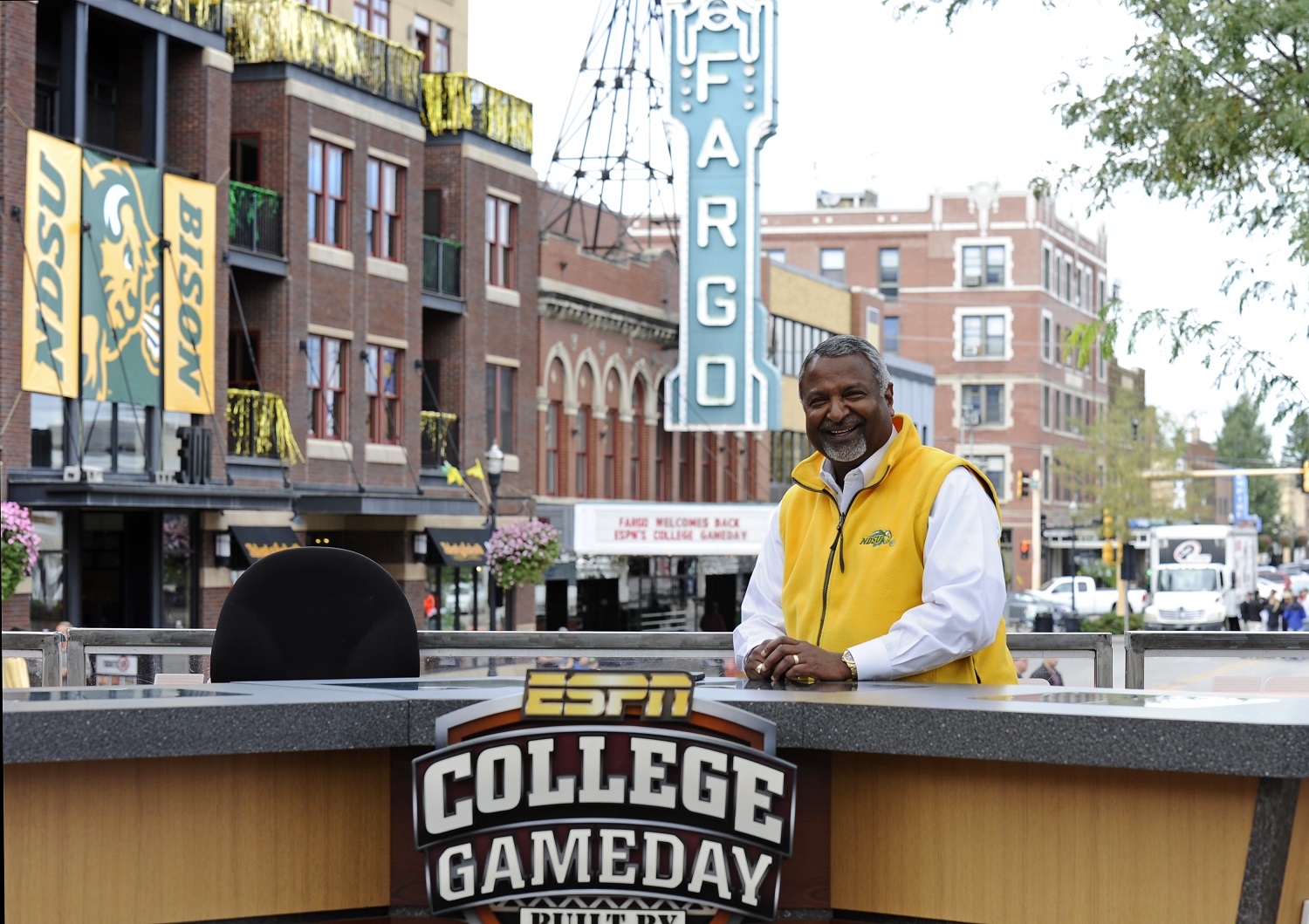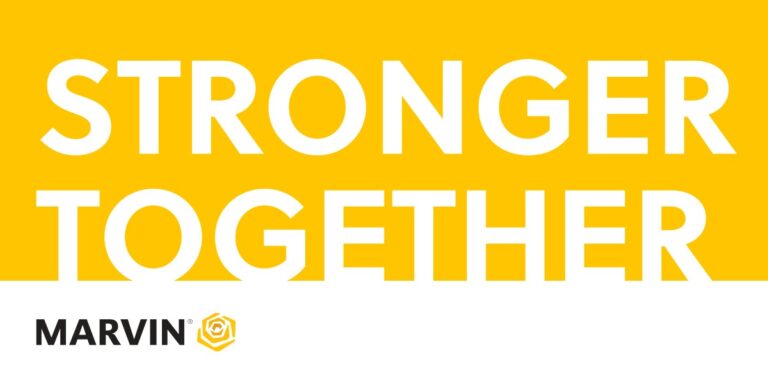Marvin’s partnership with NDSU is a testament to the power of community, innovation, and the belief that anything is possible.
Read MoreA Way Forward Through Philanthropy
Former NDSU administrators and professors stress the impact of student-focused giving.
By Micaela Gerhardt | March 11, 2021

Prakash Mathew, Dr. Thomas Riley, and Dr. James Jorgenson each served — in varying faculty and administrative roles — as diligent and compassionate facilitators of the student experience at North Dakota State University. Collectively, their careers at NDSU span from 1960 to 2015, and today they each embrace an ongoing commitment to student success through philanthropy.
From his very first days at NDSU, Prakash Mathew felt it was important to know and call people by name. He earned a graduate degree in counseling from NDSU in 1976 and accepted his first post-degree job as a student-housing manager at the former Graver Inn Hotel in downtown Fargo. Though his staff numbered in the hundreds, Prakash committed to memorizing everyone’s names. In turn, he asked that each of them simply call him “Prakash.”
“If the students are not feeling they are the number one priority, then we are not doing our job.”
Prakash Mathew
former Vice President for Student Affairs
Of the thirty-eight years Prakash spent serving in higher education, thirty-four of those years were spent at NDSU. He held a variety of positions, including Director of Residence Life, Dean of Student Life, and Vice President for Student Affairs. In 2014, he was appointed to Interim Athletic Director. No matter his role, Prakash aimed to practice and instill the principles of servant leadership he learned by watching his father, a Christian pastor who worked with Mahatma Ghandi, and those principles shaped his way of thinking about leadership and the purpose of higher education.
“I feel very strongly about this philosophically,” Prakash said, “that the only reason a university exists is for the students. Student-focused cannot simply be a slogan. How do we translate that? What does that mean? If the students are not feeling they are the number one priority, then we are not doing our job.”
Dr. Thomas Riley, former dean of the College of Arts, Humanities, and Social Sciences and retired professor in sociology and anthropology, was impressed with NDSU’s educational programs from the first moment he stepped on campus and interviewed for his position as dean. He worked at NDSU from 1996 to 2015 and said the university has consistently offered students an excellent education, but students often need financial support to earn their degrees in a timely manner.

“Young people come through in order to have opportunities, and in order for them to get through as soon as possible, they need as much support as they can get,” Dr. Riley said. “I want to be part of that.”
Dr. James Jorgenson, a professor of civil engineering from 1960 to 1996 and former chair of the Department of Civil Engineering, said the most rewarding part of his thirty-three-year teaching career was guiding students toward illuminating moments of understanding.
“What’s fun to see is when you’re working with the students and you can see their lightbulb come on,” Dr. Jorgenson said. “That’s the reward in teaching.”
Now, he sees philanthropy as an impactful and practical way to ensure continued student success.
“It’s an exciting time for kids in college,” Dr. Jorgenson said.
Still, he and his wife, Jean, recognize students face serious financial challenges due to the rising cost of higher education. Dr. Jorgenson remembers a time when tuition cost less than a thousand dollars per year and students could afford to pay for their education by working summer jobs. In fact, he spent a summer working as a roughneck on an oil drilling crew in order to make enough money to go to school, but notes, “You can’t do that today, so college students need help.”

The disparity between the cost of college tuition and the minimum wage means that many students shoulder significant debt. In North Dakota, minimum wage workers make $7.25 per hour according to U.S. Department of Labor; at such rate, a minimum wage worker working 40 hours per week would earn an annual income of approximately $15,000 before deducting taxes, health insurance, retirement, and other potential benefits. For the 2020-2021 academic year at NDSU, the average cost of tuition, housing, student fees, books, and a meal plan is $19,846 according to NDSU’s projected cost of attendance. In a competitive job market, many students also obtain internships in order to gain experience; though beneficial and enriching, such positions are often unpaid or low-paying. These real-life scenarios illustrate Dr. Jorgenson’s point — the cost of earning a college degree has changed significantly, and scholarships can help bridge the gap for today’s students.
“When you think back to our education, it was financed by scholarships and a forgivable loan. Without that help we wouldn’t be where we are today, so it’s very logical to give back and help people move in that same direction.”
Dr. James Jorgenson
former professor of civil engineering (1960-1996) and former chair of the Department of Civil Engineering
During his service as a dean and professor, Dr. Riley also bore witness to many of the difficulties facing students outside of the classroom. He noticed that many students who held off-campus jobs struggled to graduate in four years and, as a result, were still daunted by accumulating student-debt. He also observed that often, students working off-campus felt less connected to their campus communities — a trend he and his wife, Ann, still see today.
“Right now, students are struggling because more of them are having to work more hours to maintain themselves in school,” Dr. Riley said. “I hope other people recognize that — students are really, really stressed in ways they have not been before.”
Benefactors who support scholarship funds help alleviate students’ financial concerns, giving them more time and energy to commit to their studies and empowering them to get more involved both on campus and in the community.
But in order for that to happen, students first have to enroll. When Prakash considers the challenges of supporting students in higher education, he points to recruitment. Scholarships do more than provide financial support to current students — they play a big role in attracting and retaining talented and eager college applicants.
“People talk about all of the great things happening at NDSU, which is wonderful,” Prakash said. “I also go and brag about all of that. At the same time, the people need to know how important the recruitment process is. We can’t match what other universities are doing with scholarship and financial help. We need alumni and friends of NDSU to help in terms of scholarships — whatever they can afford.”
Motivated to welcome new students to the Bison family, Prakash and his late wife, Sandy, established a scholarship available to incoming NDSU freshmen who demonstrate leadership qualities and financial need regardless of their area of study. Prakash said he wanted admissions and enrollment staff to have maximum flexibility in the recruitment process.
“We know NDSU is the best place in terms of the education we provide,” Prakash said. “I know former graduates will testify to that. We are one of the top universities in the nation. When everything is equal, students go wherever there is more money.”
There are many philanthropic possibilities for supporting students at NDSU as Prakash and Sandy Mathew, Dr. Thomas and Ann Riley, and Dr. James and Jean Jorgenson demonstrate. Each couple has supported NDSU students in unique ways. Because Dr. Jorgenson taught in the College of Engineering for more than thirty years, he and Jean felt compelled to give to students who shared similar passions and aspirations for engineering.
“When you think back to our education, it was financed by scholarships and a forgivable loan. Without that help we wouldn’t be where we are today, so it’s very logical to give back and help people move in that same direction,” Dr. Jorgenson said. “The College of Engineering has been very good to me and to us, and it’s been a real pleasure to work with the students and staff.”
The Jorgensons also took advantage of NDSU Giving Day — an annual 24-hour online fundraising campaign — in 2020 by establishing a scholarship challenge and encouraging other NDSU benefactors to support the College of Engineering along with them.
“NDSU is literally the future of North Dakota. Young people who go here deserve to be supported as best we can support them.”
Dr. Thomas Riley
former dean of the College of Arts, Humanities, and Social Sciences
The Rileys have supported NDSU students in a variety of ways, including an endowed scholarship. In 2020, shortly after the pandemic sent students home for the spring semester, the Rileys made a gift to the Student Emergency Fund. Dr. Riley said they recognized the unique pressures facing current and incoming students and wanted to help mitigate those challenges. Dr. Riley compares the pressures of today to the strains incoming students felt following the 1997 Grand Forks flood.
“They had no closure after the flood,” Dr. Riley said speaking of new freshmen enrolling at NDSU in the fall of 1997. “Their prom was gone, they had no graduation, they just essentially slid away — there was no closure for their high school experience. A lot of those students were really suffering when they came here as freshmen and giving them a really good college experience was really important for them to recover from this.”
Today, Dr. Riley sees a way forward through philanthropy.
“NDSU is literally the future of North Dakota,” he said. “Young people who go here deserve to be supported as best we can support them. We have graduated a good number of people who have helped make North Dakota the place that it is, and we’ve got to continue doing that.”
For the Jorgensons, giving a gift to NDSU students was an extension of a shared belief: that they have a responsibility to share the gifts they have been given with others who are in need.
“We need to help those who need a little assistance now, and that’s the idea — to share with those who can benefit from it,” Dr. Jorgenson said.
He and Jean look forward to getting to know their scholarship recipients and learning about their goals for the future. For the Jorgensons, it’s all about watching NDSU students continue to thrive.
“Everybody has a role to play — even after graduation,” Prakash said. “They have a role to play of spreading good news. If they had a great experience, share that news. If they feel good about a place, they need to think about making an investment.”
“It’s almost like an orchestra — to make that good harmony, we need all the musical instruments.”
Share This Story
Related Stories
Success: A Team Project
With support, Caryn Marty ’26 is empowered to say “yes” to all the possibilities NDSU has to offer.
Read More
